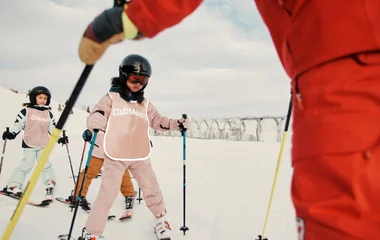When cross-country skiing, it's important to prioritize safety. This will help ensure you and your family return happy and healthy. Here are some essential safety precautions to keep in mind:
1. Dress Appropriately: Wear layers of moisture-wicking and insulated clothing to regulate your body temperature. Avoid cotton, as it retains moisture and can freeze when you sweat, leading to potential frostbite or hypothermia. Don't forget to wear a warm hat, gloves and ideally, merino wool socks. Protect your eyes from the sun's glare off the snow by wearing sunglasses or goggles. Be sure to apply sunscreen to any exposed skin, especially the face.
2. Know the Trail Conditions: Check weather forecasts and trail reports before heading out. Be aware of any warnings or closures due to weather or avalanche risks. Adjust your plans accordingly and choose trails that match your skill level.
3. Use Proper Equipment: Ensure that your equipment is in good condition and fits properly. Bindings should be adjusted to your weight and skill level. Check your boots, skis, and poles for wear or damage before heading out on the trail.
4. Warm-Up and Stretch: Take time to warm up and stretch your muscles before starting to avoid pulling any muscles.
5. Progress Gradually: If you're new to cross country skiing, begin with shorter and easier trails to build your skill and stamina. Progress gradually to more challenging terrain as your abilities improve.
6. Stay Hydrated and Fuel Up: Carry water or a hydration system with you and drink regularly to stay hydrated. Pack energy snacks to replenish energy levels during longer outings.
7. Follow Trail Etiquette: Familiarize yourself with the rules and etiquette of cross country skiing. Yield to faster skiers, pass safely, and respect the rights of others on the trails.
8. Watch Your Surroundings: Stay aware of your surroundings. Keep an eye out for other skiers, obstacles, or hazards on the trail. Be cautious of wildlife and respect their space.
9. Carry Safety Essentials: Bring a small backpack with essential items such as a trail map, compass or GPS device, whistle, extra clothing, first aid kit and a mobile phone for emergencies.
10. Ski with Others: It's always safer to ski with a partner or in a group. If alone, inform someone about your planned route and estimated return time.
11. Be Prepared for Weather: Carry additional layers and a waterproof jacket in case of rain or snowfall. Seek shelter if weather conditions deteriorate rapidly.
12. Know Your Limits: Be honest about your abilities and fitness level. Don't push beyond your limits or ski in extreme weather conditions. If you feel fatigued or experience pain, take breaks and rest as needed.




